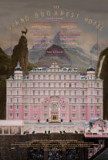Grand Budapest Hotel, The (United Kingdom/Germany, 2014)
March 12, 2014
From The Royal Tenenbaums to Fantastic Mr. Fox, Wes Anderson's movies have always been quirky with exaggerated characters and surreal settings. The Grand Budapest Hotel is instantly recognizable as the director's output - it possesses all the qualities that make Anderson beloved by his admirers and disliked by those who find his films pretentious and inaccessible. Compared to his earlier work, The Grand Budapest Hotel is a middle-of-the-road effort. It's not as endearing as Moonrise Kingdom but not as tedious as The Darjeeling Limited. It offers an engaging 90+ minutes of unconventional, comedy-tinged adventure that references numerous classic movies while developing a style and narrative approach all its own.
The Grand Budapest Hotel's structure resembles a nesting doll. The opening scene features a young woman approaching a statue in a cemetery. She begins to read from a book written by the man whose image is before her. Cut to the 1980s, where that man, an unnamed author (Tom Wilkinson), discusses his craft. He talks about how one of his stories relates to a past experience. Flash back another 20 years to the lobby of The Grand Budapest Hotel, a once storied venue in the fictional European Republic of Zubrowka that has fallen into disrepair. There, a younger incarnation of the author (now played by Jude Law) encounters the hotel owner, Mr. Mustafa (F. Murray Abraham) and, over dinner, another tale unfolds - one that transpires during the 1930s when Mustafa was just a lad. That account, buried four layers deep, is the primary subject matter of The Grand Budapest Hotel. Everything else is window dressing.
In the 1930s, with a fascist government on the rise and war looming on the horizon, The Grand Budapest Hotel is one of Europe's premiere resorts, due in no small part to the efforts of the superlative concierge, M. Gustave (Ralph Fiennes) and his apprentice, Zero Mustafa (Tony Revolori). Things change when a frequent guest dies and leaves a valued painting to Gustave. The woman's heirs, led by her son, Dmitri (Adrien Brody), seek to retain the painting by any means possible. Gustave ends up falsely imprisoned for murder in a military stockade. Meanwhile, Dmitri, aided by his psychopath associate, Jopling (Willem Dafoe), searches for a copy of a second will that, if discovered, would be disadvantageous to his inheritance aspirations. Jopling's preferred method of handling this investigation involves murder - something he's quite good at.
Gustave, as played by the impeccable Ralph Fiennes, is a caricature of the always-proper gentleman. He is immaculately groomed and cares more about appearance and decorum than anything else. He's never unctuous and manages to be strangely endearing. Some of the film's most amusing moments occur when Gustave slips out of character with a burst of anger or profanity. He is at the heart of The Grand Budapest Hotel - everyone else is in orbit around him.
The film's longest stretch transpires within the walls of the stockade where Gustave is imprisoned. This segment has been influenced by and serves as an homage to classics like The Great Escape and Stalag 17. Later, a lengthy downhill chase pokes fun at the propensity in modern cinema to embrace increasingly elaborate, computer-enhanced action sequences. The punch line, which I won't reveal here, is laugh-aloud funny. As is his m.o., Anderson's shots are carefully composed. He uses multiple aspect ratios (depending on the time frame in question) and one scene is in black-and-white.
Anderson packs the cast with familiar faces in cameo roles: Mathieu Amalric, Harvey Keitel, Bill Murray, Jason Schwartzman, Tilda Swinton, Tom Wilkinson, Owen Wilson, and Bob Balaban. Many of those actors have previously worked with the director. Of those with more substantive roles, Adrien Brody, Willem Dafoe, and Edward Norton have a shared history with him. This is Fiennes' first journey with the director and it represents a rare comedy for an actor who is drawn to darker, more serious material.
The unpredictability of The Grand Budapest Hotel's narrative allows it to progress at a fast clip. Infused with Anderson's idiosyncratic humor as delivered by a squadron of accomplished actors, the movie provides compelling reasons to seek it out. This won't convert those who find the director too abstruse but it represents a pleasant diversion for those who are weary of cookie-cutter motion pictures.
Grand Budapest Hotel, The (United Kingdom/Germany, 2014)
Cast: Ralph Fiennes, Tony Revolori, Adrien Brody, Willem Dafoe, Edward Norton, Jeff Goldblum, Saoirse Ronan, F. Murray Abraham
Screenplay: Wes Anderson
Cinematography: Robert D. Yeoman
Music: Alexandre Desplat
U.S. Distributor: Fox Searchlight
U.S. Release Date: 2014-03-14
MPAA Rating: "R" (Profanity, Sexual Content, Violence)
Genre: COMEDY/ADVENTURE
Subtitles: none
Theatrical Aspect Ratio: 2.35:1
- Dope (2015)
- (There are no more better movies of Tony Revolori)
- (There are no more worst movies of Tony Revolori)
Comments